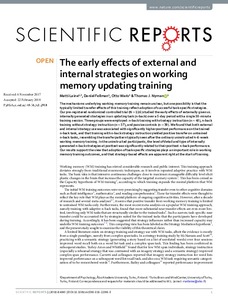The early effects of external and internal strategies on working memory updating training
Matti Laine; Daniel Fellman; Otto Waris; Thomas J. Nyman
The early effects of external and internal strategies on working memory updating training
Matti Laine
Daniel Fellman
Otto Waris
Thomas J. Nyman
NATURE PUBLISHING GROUP
Julkaisun pysyvä osoite on:
https://urn.fi/URN:NBN:fi-fe2021042718997
https://urn.fi/URN:NBN:fi-fe2021042718997
Tiivistelmä
The mechanisms underlying working memory training remain unclear, but one possibility is that the typically limited transfer effects of this training reflect adoption of successful task-specific strategies. Our pre-registered randomized controlled trial (N = 116) studied the early effects of externally given vs. internally generated strategies in an updating task (n-back) over a 5-day period with a single 30-minute training session. Three groups were employed: n-back training with strategy instruction (n = 40), n-back training without strategy instruction (n = 37), and passive controls (n = 39). We found that both external and internal strategy use was associated with significantly higher posttest performance on the trained n-back task, and that training with n-back strategy instruction yielded positive transfer on untrained n-back tasks, resembling the transfer pattern typically seen after the ordinary uninstructed 4-6-week working memory training. In the uninstructed participants, the level of detail and type of internally generated n-back strategies at posttest was significantly related to their posttest n-back performance. Our results support the view that adoption of task-specific strategies plays an important role in working memory training outcomes, and that strategy-based effects are apparent right at the start of training.
Kokoelmat
- Rinnakkaistallenteet [29335]
